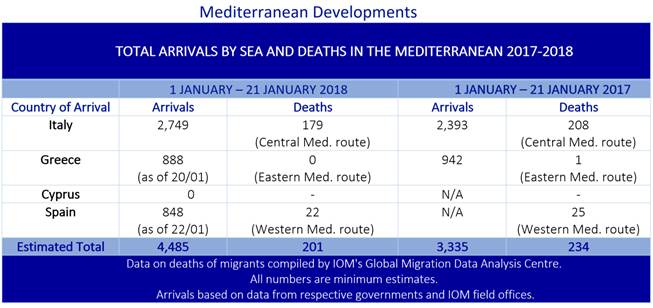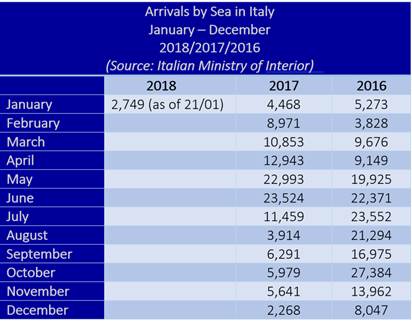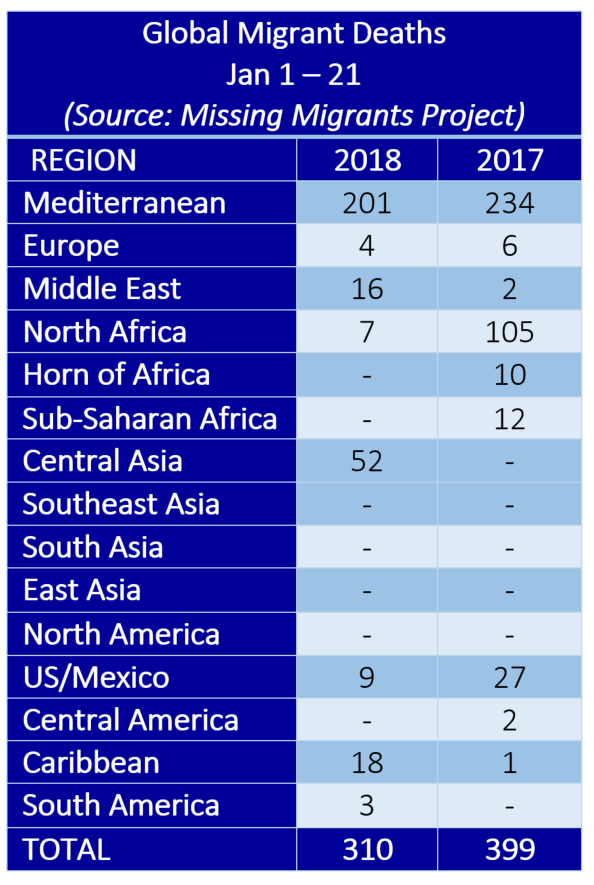-
Who we are
WHO WE AREThe International Organization for Migration (IOM) is part of the United Nations System as the leading inter-governmental organization promoting since 1951 humane and orderly migration for the benefit of all, with 175 member states and a presence in 171 countries.
-
Our Work
Our WorkAs the leading inter-governmental organization promoting since 1951 humane and orderly migration, IOM plays a key role to support the achievement of the 2030 Agenda through different areas of intervention that connect both humanitarian assistance and sustainable development.
What We Do
What We Do
Partnerships
Partnerships
Highlights
Highlights
- Where we work
-
Take Action
Take Action
Work with us
Work with us
Get involved
Get involved
- Data and Research
- 2030 Agenda
Mediterranean Migrant Arrivals Reach 4,485 in 2018; Deaths Reach 201
Geneva – IOM, the UN Migration Agency, reports that 4,485 migrants and refugees entered Europe by sea through 21 January. This compares with 3,335 coming ashore during a similar period in 2017. Italy accounts for approximately 60 per cent of the total, with the remainder split between Spain (19 per cent) and Greece (20 per cent).

IOM Italy’s Flavio Di Giacomo reported Monday (22/01) that a total of 2,749 migrants or refugees have arrived in Italy by sea this month, according to official Italian Ministry of Interior figures. That’s about a 15 per cent increase over the same period in January 2017, at the start of a late winter flow when arrivals quickly outpaced the totals from previous winters (see chart below).

IOM Athens’ Kelly Namia reported Monday that over four days, 17-20 January, the Hellenic Coast Guard reported one incident requiring search and rescue operations off the island of Lesvos. The Coast Guard rescued 32 migrants and transferred them to the respective island. Fewer than 50 migrants arrived during those days.
Greece arrivals this year continue a trend that began in 2017, when migrant arrivals along the Mediterranean Sea’s Eastern routes hit their lowest levels in four years (see chart below).

IOM Spain’s Ana Dodevska reported Monday total land and see arrivals of irregular migrants through the month’s first three weeks have topped 1,000, including 216 border crossings at the African enclave of Melilla.
In Tunis, IOM's Olivia Headon reported that from 7 January through 17 January, coastal authorities in Libya have intercepted or rescued 1,497 migrants attempting to reach Europe by sea. Included in that figure were 81 children. IOM Libya also learned yesterday that fishermen near Qarapoli retrieved the remains of an African man. Authorities said the man's body was tangled in fishing nets and that this was the second such incident in recent days.
Since the last IOM report on Friday (19/01) the organization’s Missing Migrants Project (MMP) added two more deaths in the Mediterranean, both on the Western route linking Africa to Spain. Two men, of Sub-Saharan origin, were pulled from the water 10 miles west of the Island of Alboran on Saturday, (20/01) after their boat sank while trying to reach Spain, according to the Spanish maritime rescue service. Thirty-four others were rescued and brought to Almería, Spain.
Worldwide, IOM’s Missing Migrants Project (MMP) has recorded the deaths of 310 people during migration in 2018, many of those recorded at sea (see chart below).

Over the weekend, local authorities in Curaçao reported that human remains were found on the northeast shore of the island that could be connected to the shipwreck of 10 January, in which five Venezuelan migrants lost their lives. Venezuelan civil protection officials said they have accounted for 16 survivors of the voyage which may have had as many as 34 people on board when their vessel departed South America, all believed to be Venezuelan. An estimated 13 migrants remain missing.
On the US/Mexico border, winter cold continues to take its toll. The remains of five migrants who appeared to have died from hypothermia were recovered by authorities in Brooks County, Texas, on 21 January.
In the Middle East last week, 16 Syrian refugees lost their lives near the Masna’a border crossing in eastern Lebanon during a winter storm. Local authorities confirmed that 14 bodies (six women, two children and six men) were retrieved on Friday (19/01), while the bodies of a 30-year-old woman and a 3-year-old girl were found on Sunday, 21 January.
In Central Asia, 52 Uzbek migrant workers died last week in a bus fire in the Aktobe region in Kazakhstan. The bus was traveling along a road frequently used by migrant workers heading to the Russian border. Five people managed to escape the burning vehicle and survive the fire.
Missing Migrants Project data are compiled by IOM staff but come from a variety of sources, some of which are unofficial. To learn more about how data on missing migrants are collected, click here.
Latest Mediterranean Update infographic: https://missingmigrants.iom.int/pdf?url=https://missingmigrants.iom.int/region/mediterranean/pdf
For latest arrivals and fatalities in the Mediterranean, please visit: http://migration.iom.int/europe
Learn more about the Missing Migrants Project at: http://missingmigrants.iom.int
For more information, please contact:
Joel Millman at IOM HQ, Tel: +41 79 103 8720, Email: jmillman@iom.int
Mircea Mocanu, IOM Romania, Tel: +40212115657, Email: mmocanu@iom.int
Dimitrios Tsagalas, IOM Cyprus, Tel: + 22 77 22 70, E-mail: dtsagalas@iom.int
Flavio Di Giacomo, IOM Coordination Office for the Mediterranean, Italy, Tel: +39 347 089 8996, Email: fdigiacomo@iom.int
Hicham Hasnaoui, IOM Morocco, Tel: + 212 5 37 65 28 81, Email: hhasnaoui@iom.int
Kelly Namia, IOM Greece, Tel: +30 210 991 2174, Email: knamia@iom.int
Julia Black, IOM GMDAC, Berlin, Tel: +49 30 278 778 27, Email: jblack@iom.int
Christine Petré, IOM Libya, Tel: +216 29 240 448, Email: chpetre@iom.int
Ana Dodevska, IOM Spain, Tel: +34 91 445 7116, Email: adodevska@iom.int
Myriam Chabbi, IOM Tunisia, Tel: +216 71 860 312 ext. 109, Mobile: +216 28 78 78 05, Email: mchabbi@iom.int